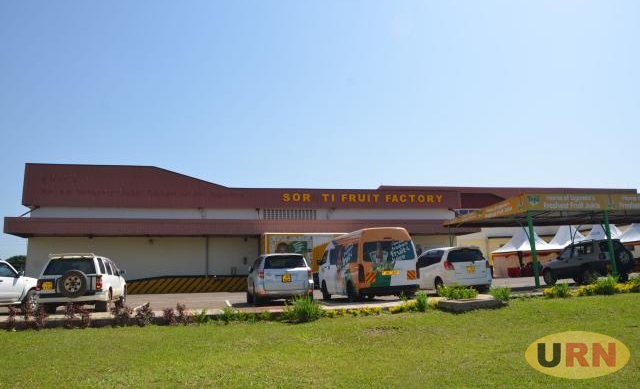
Soroti, Uganda | THE INDEPENDENT | The government has announced plans to expand the Soroti fruit processing factory at a cost of Shs 40 billion to meet farmers’ expectations. Chimaki Agro Limited, the firm hired by the government to operate and manage the facility on behalf of both the government and farmers, will oversee the expansion in three phases.
The first phase will involve constructing a warehouse and installing a bottle filling line. The second phase will focus on installing a processing line for ready-to-drink juices made from pineapples, apples, and mangoes. The third phase will emphasize value addition, specifically the production of fertilizers for farmers.
Azeb Mesfin Haile, widow of former Ethiopian Prime Minister Meles Zenawi and Director of Chimaki Agro Ltd, confirmed that the government has allocated a budget for the expansion, which is expected to begin anytime. Additionally, Azeb announced that during this season, from June to July, the factory plans to purchase about 1.5 million kilograms of oranges. The facility also aims to process passion fruits, pineapples, and apples.
In the next ten months, it is expected to achieve international certification, enabling Teju Juice to be sold in foreign markets, including the Middle East. Azeb urged farmers to improve the quality of their fruits to meet global standards for juice exports.
This was disclosed during a meeting between factory management and local farmers to discuss achievements and challenges, while jointly addressing existing gaps. Their goal is to transform the factory into a center of excellence for East and Central Africa.
Jorem Opian Obicho, Chairperson of the Teso Tropical Fruits Growers Cooperative Union (TEFCU), noted that earlier conflicts before Chimaki took over had delayed funding for the factory’s expansion. However, he praised the new management for establishing direct communication with the head of state, which led to the release of funds within the first nine months of Chimaki’s tenure.
Opian also called for increased government support. In addition to fruit processing, the firm is exploring fertilizer use to improve soil fertility for farmers. Opian encouraged fruit farmers to diversify their enterprises to increase household incomes. He also revealed that the factory has begun exporting concentrated juice to Tanzania, among other destinations.
Furthermore, it was revealed that the factory has commenced processing local mangoes and tamarind into ready-to-drink juice. Farmers were urged not to cut down tamarind trees. Officials announced that the firm has partnered with the Soroti Catholic Diocese Integrated Development Organisation (SOCADIDO) to obtain accurate data on citrus fruits in the subregion—data which had previously been lacking.
Chimaki is also working to connect with external resources to address diseases and pests affecting fruit farmers in Teso. During the meeting, farmers were trained on how to improve the quality of their fruit to meet international standards. The factory’s quality assurance officer emphasized that maintaining quality begins at the farms, including controlling diseased fruits and proper sorting before delivery.
Boaz Baherezibwa, a special presidential assistant recently assigned to oversee Chimaki’s operations, expressed gratitude that the firm compensates farmers upon delivery. He said farmers earned over Shs 1.2 billion in the last season alone.
Charles Elasu, a presidential advisor, along with Baherezibwa, commended the President for appointing Chimaki to manage the factory and for increasing funding by Shs 20.4 billion, in addition to the earlier Shs 19 billion. They believe the expansion will offer renewed hope to fruit farmers in Teso. Elasu thanked the government for expanding the factory, saying it will accommodate more produce, and emphasized the need to diversify the fruits processed.
Elasu also called for improved branding and packaging to meet international standards, suggesting that the name “Teso Juice” be reconsidered as the product enters foreign markets. Together with Lt. Col. (rtd) Isa Echodu, a farmer from Amuria, Elasu urged the government to use the UPDF Engineering Brigade for the factory expansion, citing their excellent workmanship and integrity.
Currently, the factory purchases oranges from farmers at Shs 500 per kilogram and pays Shs 300 per kilogram for local mangoes. In 2014, the President directed the construction of the fruit factory, which was officially commissioned in April 2019. The government owns 80% of the factory through the Uganda Development Corporation (UDC), while farmers, represented by their union, TEFCU, own the remaining 20%. The Teso subregion is Uganda’s leading citrus fruit producer.
The factory was established to provide a stable market for oranges and mangoes, and to address post-harvest losses. With the capacity to process six metric tonnes of fruit per hour, the facility converts produce into puree, concentrate, and natural ready-to-drink juice, branded as Teju Juice (TEJU). Situated in Arapai Industrial Park, within Soroti City East Division, the factory lies approximately 299 kilometers (186 miles) northeast of Kampala, Uganda’s capital.
****
URN
 The Independent Uganda: You get the Truth we Pay the Price
The Independent Uganda: You get the Truth we Pay the Price



